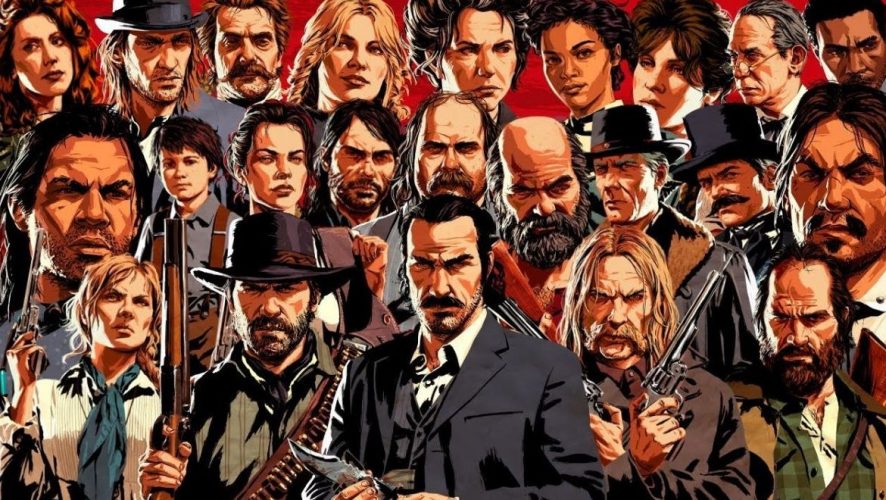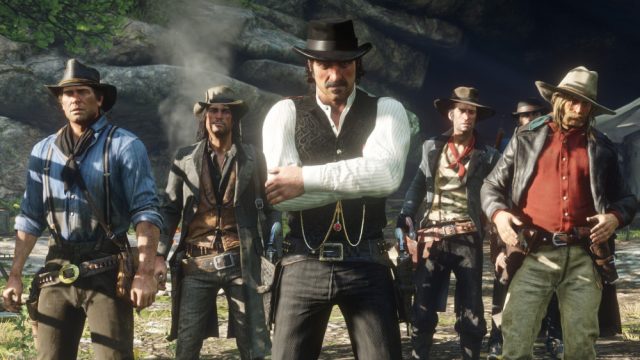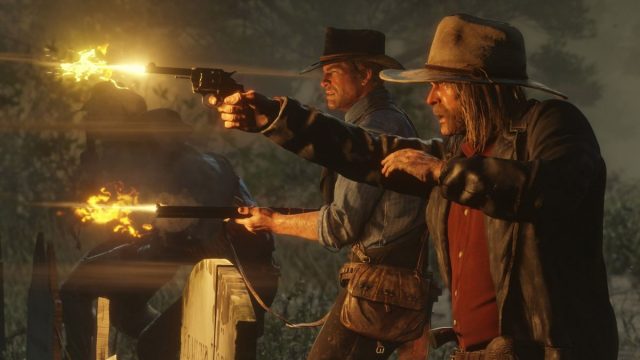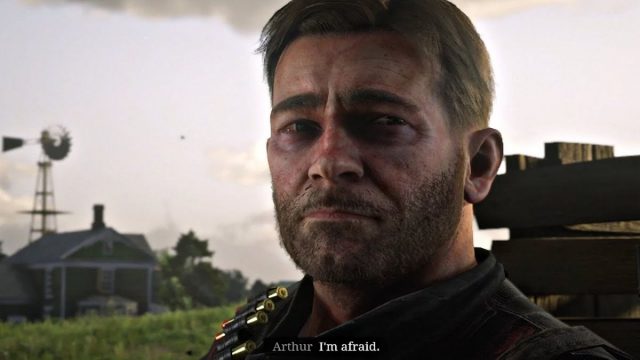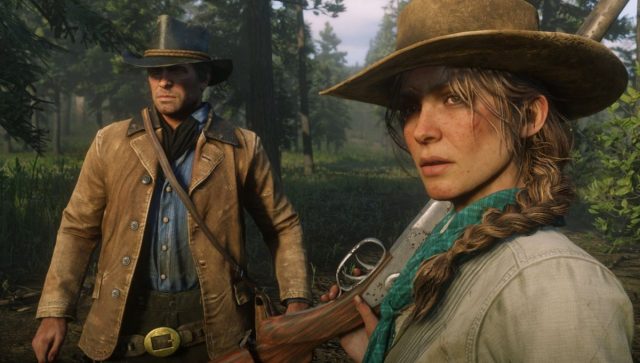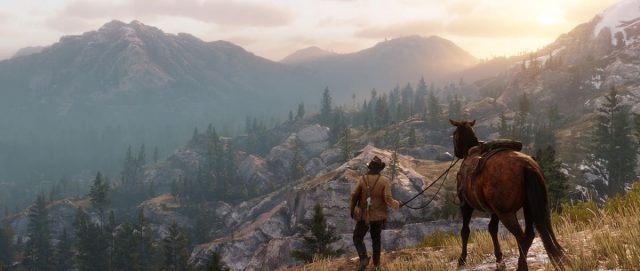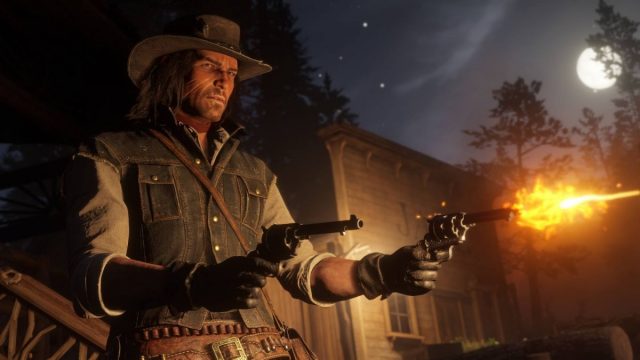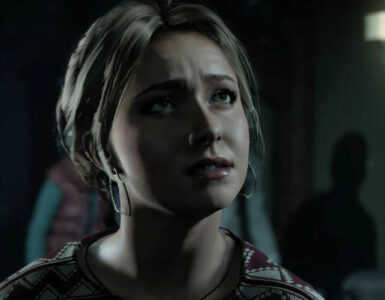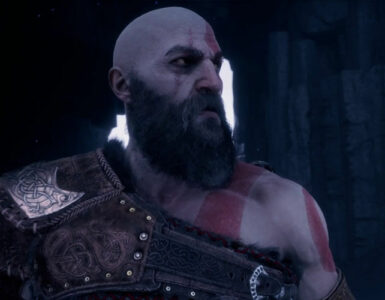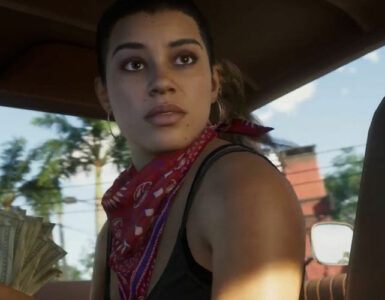It’s been a little over three months since the release of the Western action-adventure epic Red Dead Redemption 2, and players are still spending time in the new frontier.
Its predecessor, Red Dead Redemption, has been revered as a classic in modern gaming, and, as far as classics go, it was pretty damned hard to top. So it has been a pleasure for players to step into the sequel, which many are calling a worthy successor to the original.
With a beautiful but bittersweet cowboy story set in a raw, unforgiving, yet incredibly lush Wild West frontier, those who have invested hundreds of hours diving into the world as told by Arthur Morgan & Co. have been handsomely rewarded with a narrative that is, by all accounts, astounding at worst.
Just another Tuesday at Rockstar Games.
The gameplay, animations and story have been crafted with such mastery and passion, but it is the characters who truly breathed life into the game, and gives it the verisimilitude that players are so thoroughly enjoying. More specifically, it is the unsung voice actors, who have toiled away in the recording booths, and in the motion capture studios, perfecting their vocals to ensure that the characters are consistently portrayed, from the opening scenes to the end credits.
The folks at Shacknews spent the better part of a day picking at the creative minds of the talents behind some of the central characters in Red Dead Redemption 2: award-winning Roger Clark, who plays main protagonist Arthur Morgan; Rob Wiethoff, whose name is now synonymous with the iconic John Marston; Benjamin Byron Davis, another to reprise their role as Dutch van der Linde; Clark’s fellow series newcomer Alex McKenna, as the no-nonsense Sadie Adler; and not forgetting Peter Blomquist as Micah Bell, the villain we’ve all come to love to hate in both games.
[DISCLAIMER: MINOR SPOILER WARNING below, read at your own risk!]
In the production stage of Red Dead Redemption 2, which took a good four-and-a-half years, the actors gave their energies to produce the performances of the characters we know and love today.
On Motion Capture
Acting on stage or on camera is hard enough, with having thousands of lines to remember and to act each line or scene over and over again, until the director is satisfied. Now try doing that, with a motion-capture suit strapped on, while performing against a generally empty green screen set, pretending to wield weapons and straddle some random blocks that are supposed to be horses, and you have a different beast altogether.
“As far as any sort of physical challenges were concerned for me, it was more often than not my legs and my thighs more than my voice,” noted Blomquist. After all, performance capture is by no means a walk in the park – in actual fact, the actors had to do a lot of running, especially with the more physically-demanding scenes.”
“We are on a different kind of sound stage”, shared McKenna, who, like Clark, was handed her first video game role in Red Dead Redemption 2.
“Training your brain to really see the world was the biggest new thing I had to learn, using a lot of imagination in what the animators were so wonderful to give us a window of what it looked like. Anything we needed to interact with was there, but it was tubes and boxes, rather than a water tower we were climbing,” she explained.
“We were jumping off of something that sort of resembles a horse, and we were creating these relationships. Luckily, my scenes were all with these absolutely phenomenal actors, so as soon as we started playing in the world, it became very easy to jump in, and over time, because we worked on this for a number of years, became second nature.”
Clark added, endearingly: “I remember the crouch-running – that was killer on the sides. It was a good workout, though.”
When they were not running and gunning, the booth sessions would be equally challenging, requiring them to go for hours on end each day. Davis explained how he would normally do warmups before a long session, similar as to how he would do for theatre or traditional film sets.
“While there certainly was a great deal of dialogue, the challenge was more, at least speaking for myself, the memorization of all these extraordinarily beautifully written diatribes that Dutch would have than it was worrying about maintaining my voice and vocal quality because you have a lot of down time in between takes. Most of those scenes were all done in one take, so it wasn’t as though you were going over and over again shouting – hopefully, anyway.”
On Performance
It was also another cool feat to be able to stay in character for such a long time, akin to that of being on the set of a long-running TV series.
So what happens when you’re not American, don’t have a Southern accent, and don’t have first- or even second-hand experience of the Wild West era?
Being an Irishman with an all-Irish accent, Clark certainly fit the bills of a stranger in a strange land, but he rose to the challenge. Of course, he had his methods of reaching that level of believability as well.
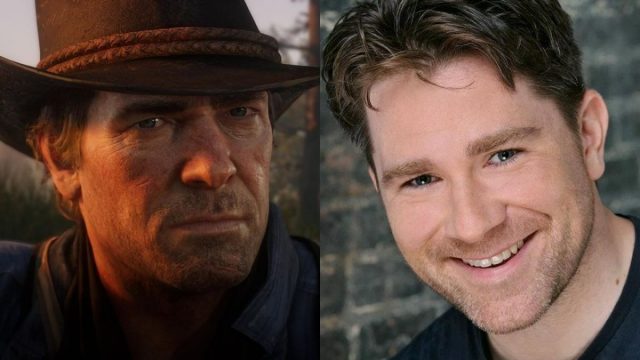
“I haven’t heard any complaints”, Clark enthused when queried about the difficulty of portraying a Southern accent accurately, “but was something that I was really conscious of.”
“I was aiming more for consistency than accuracy, considering the fact that the game is set in a pseudo-historically accurate setting, one that isn’t maybe geographically accurate to the United States, but historically and culturally was, I thought that gave me a little bit of dramatic license, which made me relax a little bit,” he noted.
“Also taking into consideration the fact that my character would have been travelling all over the country from a young age, I think it’s plausible that certain aspects of different dialects might blend into the way he talks, because my natural accent’s like that. I’m kinda half American, half Irish, half British. I know that’s three halves, sorry, but you know what I mean,” he adds with a laugh.
“It was something that I took very seriously and I worked hard on. I was going for in the end somewhat of a Southern/Texan vibe and hopefully I pulled it off.”
Despite having a plethora of Western films and actors to take notes from, such as The Good, The Bad, And The Ugly and even Clint Eastwood’s filmography respectively, Clark’s main point of reference from a performing standpoint was actually Japanese acting legend Toshiro Mifune, who popularised the strong, silent, brooding lone wolf trope, starring in the movies of another legend in worldwide cinema — Akira Kurosawa.
“I liked Toshiro Mifune from the Kurosawa movies, who in and of himself was based on A Fistful of Dollars, but Toshiro Mifune was probably my largest influence. That, and also the work of Rob Wiethoff [as John Marston] in the previous game. Rob’s work as John really defined and blew me away, so it taught me that whatever I was going to do, I would have to do my own thing, because to try and recreate that would probably have been doomed to failure, I think.”
Davis, Blomquist and Wiethoff, all of whom spent an extensive amount of time with their respective characters in the original game, focused more on remembering how they sounded before, considering it had been about a decade since they first went on the booth with them.
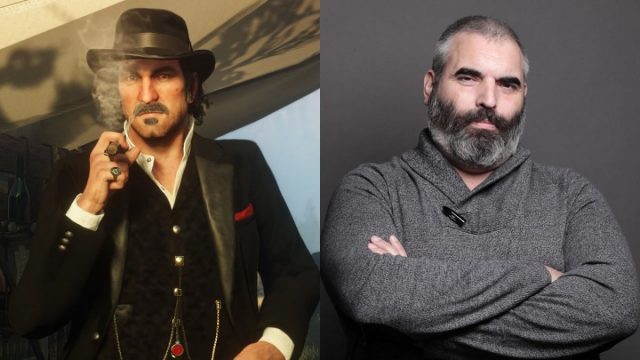
Explained Davis, “I was not concerned with a Southern dialect so much as I was returning to Dutch after so many years, not playing him, to make sure the sounds matched what we had done on the original title. I can still sort of hear in some of the earlier stuff that we did that I didn’t quite find it, but eventually I did. I don’t think that Dutch was ever supposed to be Southern. I was aiming for more of a high plains kind of sound, but then I did find out in the second game that he’s actually a Yankee, which was a surprise to me. Because Rob sounds exactly like John Marston, I was always just a little bit jealous that he could roll out of bed sounding exactly like he did ten years ago.”
Also, because Red Dead Redemption 2 is technically a prequel rather than a true sequel, the reprising characters would have to be portrayed in a slightly different light – in a way that shows how they were before the events of the original game.
Wiethoff shared that it was “fun” to revisit his role as John Marston once more, even though this version of him was younger and Wiethoff himself getting older, ironically.
“Some of the physical stuff [on set] wasn’t quite as easy as I would have wanted it to be. But the fun thing about it was John at that point in his life, he had already experienced a whole lot of heartache and a lot of things that would be tough for anyone to deal with – growing up in an orphanage, running away, falling in with a gang.”
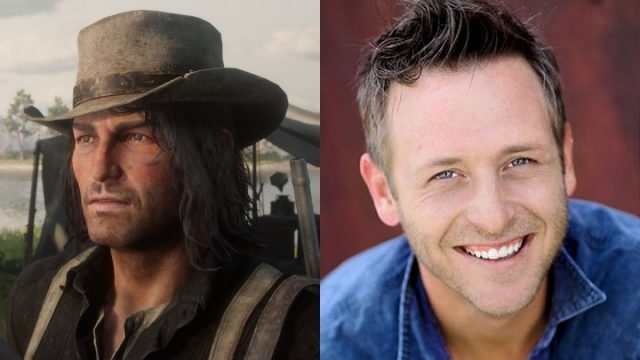
The main challenge for Wiethoff was to portray a version of Marston that wasn’t as hardened as the one we saw in the original Red Dead Redemption, or one who had yet to find his footing in the outlaw scene. Instead, Wiethoff relied on his own experience with inexperience that allowed him to relate with John.
“I can’t say that he didn’t have any life experience, but he was still young enough and I guess didn’t have enough life experience to really fully understand what it took to gain the respect from the other gang members that he saw people like Arthur receiving and he wanted that. He really wanted the respect that he was getting and he didn’t know how to get it and it was frustrating to him,” Wiethoff pointed out.
“Abigail was chasing him around all over the place, telling him to be responsible for this kid that he didn’t believe was his and he didn’t want anything to do with. It was very frustrating. I think that so many people, myself included, can find that within their own lives. Maybe not the exact same scenario, but I think we’ve all been frustrated for periods of time, and all wanted something very badly and not real sure how to get it, which adds to the frustration.”
To have the talent to deliver a great performance is one thing, but it certainly wouldn’t have been possible without the aid of a good script. The actors shared a little bit about how the writers of Red Dead Redemption 2 really did justice to the development of their characters.
“I was very fortunate that the writing was so good and that Rockstar created a character that was not your stereotype”, explained McKenna, regarding her character Sadie’s transformation from victimised woman, to becoming a gritty, independent outlaw by the end of the game.
“The way [Sadie] begins to the way she ends is quite a character arc, and I thought it was truly far more compelling that she had these intimate friend relationships, particularly with Arthur, and it didn’t end in her being sexualized or just a love interest. I thought that was pretty fantastic. So I was very excited to play her, but that was really all Rockstar.”
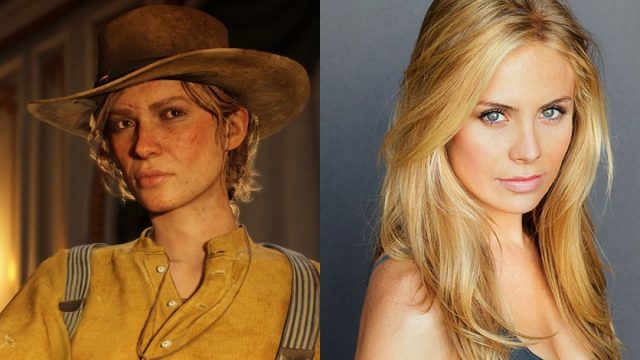
Many who played through both Red Dead Redemption games would’ve had the chance to see Dutch van der Linde’s gradual metamorphosis into a bona fide villain, and Davis had all praise go to Rockstar for allowing him the license to express Dutch the way he was meant to be portrayed.
“I’ll tell you, it’s rare that you get a character as complicated as Dutch, and one of the things I like about him is that I’ll get questions on social media about what Dutch was thinking. I like that it’s kind of up to each player to decide. I can tell you in playing the character, the choices I was making as an actor were that Dutch was motivated by a noble drive, that he did believe very much in a greater good and he believed in it quite sincerely.”
And speaking of villains, Blomquist’s portrayal of Micah Bell had garnered much of a “hate/love” reaction among fans of the game, taking to social media to express those sentiments to him. He took it as “complimentary” to how good of a job he did playing as Micah, and how much fun he had doing it.
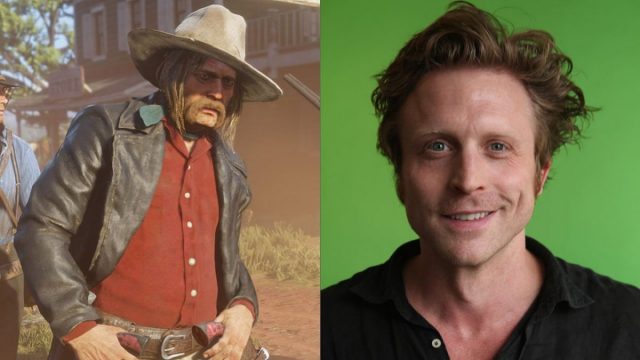
“I’ve played a handful of not-so-nice guys in the past [as Dr Fontaine in L.A. Noire], and this one pretty much tops it in my book. It’s extremely enjoyable and extremely liberating for me to delve into this particular character. I had a blast doing it – so much so, that would I need to be reined in fairly frequently, because I have a tendency to push things too far in that realm, but being surrounded by such a great team and great direction, I felt such confidence and freedom to explore that character and know that I would have people around me to guide me in the right direction. I gotta say it was thoroughly enjoyable to be an asshole.”
As Blomquist aptly puts it, “A bad guy doesn’t just exist in a vacuum”.
On Playing Video Games
Despite being new to the franchise, Clark and McKenna were no strangers to the brilliance of Rockstar Games. How? By having played their games before, of course.
Prior to being cast as Sadie, McKenna starred mainly in live-action TV series or movies, and dabbled in voice acting, having played the role of Senna, Avatar Korra’s mother in the popular animated series, The Legend of Korra.
“When I walked into the office and I saw the Rockstar logo, the gamer in me went bright red and I couldn’t have been more excited, because of course I had played Rockstar games in college, loved GTA, and had no idea what the project that we were working on was, actually, for an embarrassingly long time, but couldn’t have been more thrilled to be cast in the game in any capacity.”
Similarly, Clark had previously played through GTA and the original Red Dead before, and was immediately thrilled at the prospect of working with Rockstar for this game.
On Becoming A Voice Actor
In this present era, a lot of games have been including more opportunities for voice acting, spurring many actors to switch over. In fact, some great actors, including Clancy Brown (Lex Luthor, The Adventures of Superman) and Mark Hamill (Batman: The Animated Series) have also made their mark in the animated realm.
“Personally, I think theatre has been the best teacher for me”, shared Clark.
“There’s no filter between your performance and the audience. If something works, you know it immediately because they’re right there in front of you, and if it doesn’t work, you also know immediately because they usually start coughing and walking out. Personally, that’s where I broke my teeth on the whole thing, and it could have been worse I think.”
Davis also commented, saying that it doesn’t really matter what kind of actor you are or what kind of platform you choose to perform on. “At the end of the day, you’re a storyteller.”
Blomquist shared that it isn’t so simple as to just declare you want to do voice acting. He was “doing a lot of other things that have nothing to do with video games and motion capture”, mainly being on the silver screen or theatre, but at the same time, “here’s this new industry that stuff evolved in this way, opening up all kinds of opportunities.”
“I would say keep acting, keep moving forward, keep studying those video games, and get out there.”
“I think perseverance is probably the thing that many of us have had to hang our hats on in many moments, because being an actor is difficult in the work that it requires but also in the time in between jobs”, said McKenna. “I don’t know one actor who hasn’t had six months to a year when work has been scarce, so doing what you need to do to support your creativity, and to not give up is what I would suggest.”
“A whole lot of luck went into me finding my way into video games, and I don’t know how I did it”, added Wiethoff.
“I do want to encourage people, that if you are interested in doing anything creative, please do it. Even if you do it only for yourself. You should know you’re gonna get made fun of by people. It doesn’t matter if you’re successful at what you do or not. Don’t worry about that. You’re living your life hopefully for your benefit and no one else’s, and please allow me to help you have the confidence to chase your interests because it can be very fulfilling.”
And his final thoughts?
“I just want that for people to know that, even if you’re going to be the only person who enjoys whatever you create, sometimes that’s enough. Please do follow it. Chase it. Enjoy it.”
Marion has a serious RPG addiction. Sometimes it bleeds into real life; he forgets to sleep because he thinks he has a Witcher’s body clock. Forgive him in advance if he suddenly blurts out terms such as “Mind Flayer” and “Magic Missile”, because never once does he stop thinking about his next Dungeons & Dragons game.

